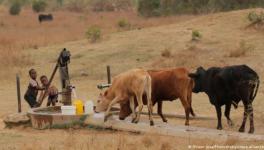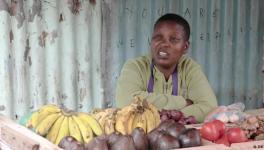Small-scale Organic Farming in Zimbabwe and its Challenges
Talking to Newsclick about the challenges faced by small landholders who are into organic farming in Zimbabwe, Nelson Mudzingwa, National Co-ordinator of ZIMSOFF, Zimbabwe, says large Multi-national Corporations have adversely affected the local production in their country. They have dumped food, which is priced low, into their markets. This has reduced the income levels of the farmers. The GMOs that have been introduced by these corporations has affected the local seed biodiversity. Mudzingwa says the Multi-national Corporations are trying to change the seed laws in their favour by controlling local policies and through commodification and privatization of seeds.

Transcript:
Newsclick (NC): Given your experience with small holder organic farmers, what have been the major challenges in scaling this up both within Zimbabwe and globally?
Nelson Mudzingwa (NM): The major challenges with small holder farmers have been the issues of the multinational companies. We've actually continued to affect the small holder farmers by bringing their technologies such as the genetically modified organisms, such as the commodification and privatization of seeds and even food. So the rural people have actually ended up having very scarce food to.... and even getting very limited resources especially to necessitate their production and also to improve their activities which are home grown.
NC: What has been your experience of working with women farmers and what is their status in Zimbabwe? Are they recognised?
NM: Yes in Zimbabwe women are recognised. You'd find in most rural areas women occupy the major stake. They're actually the people who are actually doing all the farming. Most men are not staying in the rural areas. Most men, normally, work in urban areas. So you find women doing much of the work in the rural areas and as of recent Government of Zimbabwe has actually introduced a policy to integrate women in decision making positions. Even in government you'd find there are women who are actually taking a leading role in making certain decisions even from Parliament, even at local authority level and even at local level where you find women participating in the groups and even in the farm organisations they're taking a very leading role. Like, for example, in the organisation I'm working with, our Chairperson is actually a woman and she's actually developed from grass root level to become an international representative of our organisation by getting that support from our national government as well as support from other organisations we are working with. So I would say there is quite a substantive effort that is being put by our national government to take women on stake in terms of making decisions and taking leading positions.
NC: In what manner have the large corporations challenged the rise of small holder organic farmers?
NM: One of the most effect with large corporations is that they've actually come in with quite a lot of food they're dumping onto our markets and this food is actually affecting our local production because it's actually brought in with very low prices which if you compare to our production cost at local level value, you'd find our farmers are actually affected in terms of their income levels. The other issue is that these large corporations if introduced the GMOs, this is seed that is actually produced by technology which is not home-grown and which is actually affecting our local seed biological diversity and also limiting our local farmers to continue with their own home-grown seed. The other issue that large corporations are doing is actually to control our local policies. Like, for example, in our region we have got the issue to dealing with seeds where we're talking about the harmonisation of the seed laws and the large corporations are actually moving for removing the farmer seed rights which is actually a very serious issue at our local level which we cannot, as small holder farmers, accept in any given way.
NC: How do you think local and global farmer movements can come together to create an alternative mode of production and distribution?
NM: Most important is that we need to build up strategies whereby we look at it very closely and concede the participation of the households. You know the household is actually the hub of any development that can happen in any given nation. So if we build on our movements with a clear focus and with a clear understanding on the participation of households, we definitely are going to build successful movements because the household is whereby you talk about food sovereignty. The household is whereby you talk about conservation of resources and the household is whereby you talk about participation of even men and women in decision making. So it's very important to consider the household. If you'd grow, there is another level whereby you'd find different movements coming together to actually co-operate in a way, maybe by identifying your strengths because sometimes there can be quite a lot of duplication of effort whereby this movement can be talking the same issue like the other movement but if we co-operate in a way of identifying our strengths and weaknesses and knowing our agenda and knowing our effort, I think definitely we can achieve issues like for example, the issue dealing with food sovereignty and the issue dealing with even any sustainable development you can talk about in rural development.
Get the latest reports & analysis with people's perspective on Protests, movements & deep analytical videos, discussions of the current affairs in your Telegram app. Subscribe to NewsClick's Telegram channel & get Real-Time updates on stories, as they get published on our website.




















